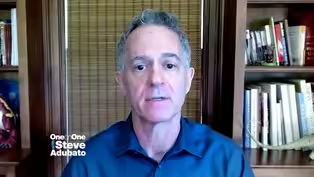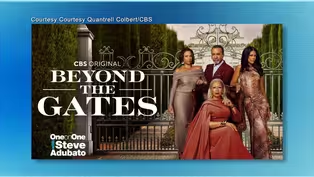One-on-One
The importance of female representation in the legal field
Clip: Season 2025 Episode 2837 | 8m 28sVideo has Closed Captions
The importance of female representation in the legal field
Steve Adubato speaks with Marie L. Mathews, Managing Member of CSG Law, to discuss the representation of women in the legal field, the importance of mentorship in developing young attorneys, and the impact of AI on the future of the legal profession.
Problems playing video? | Closed Captioning Feedback
Problems playing video? | Closed Captioning Feedback
One-on-One is a local public television program presented by NJ PBS
One-on-One
The importance of female representation in the legal field
Clip: Season 2025 Episode 2837 | 8m 28sVideo has Closed Captions
Steve Adubato speaks with Marie L. Mathews, Managing Member of CSG Law, to discuss the representation of women in the legal field, the importance of mentorship in developing young attorneys, and the impact of AI on the future of the legal profession.
Problems playing video? | Closed Captioning Feedback
How to Watch One-on-One
One-on-One is available to stream on pbs.org and the free PBS App, available on iPhone, Apple TV, Android TV, Android smartphones, Amazon Fire TV, Amazon Fire Tablet, Roku, Samsung Smart TV, and Vizio.
Providing Support for PBS.org
Learn Moreabout PBS online sponsorship(upbeat music) - We're now joined by Marie Mathews, managing member of CSG Law.
Marie, good to see you.
- Good morning, Steve.
Good to see you as well.
- You got this.
Let me share with folks that in my other life, doing a leadership and communication coaching, I lead and facilitate the CSG Leadership Academy with some top attorneys looking to become even better leaders, and Marie has been a key to that effort.
So thank you for that, Marie.
- No, thank you.
It was a great program and our people really enjoyed it.
- Yeah, let's talk about this.
Why is, someone gets trained in law, they go to law school, they understand case law, et cetera, et cetera, right?
But that's not the same, and you and I have talked about this, Marie's come in and done a whole range of conversations with the students in the academy.
That's not learning to be a leader.
Where does that happen, Marie?
Or is it osmosis, it's supposed to happen?
- Well, of course there's people who are naturally inclined to have that in them, but it's really developed through mentorship at the firm and watching how other people do it.
At least that's my view.
When we try to develop that in our young associates that we see who are interested, who have the spark, and get them involved in programs just like yours to help them along.
- Yeah, along those lines, and we've also had a look at previous editions of our sister series Lessons and Leadership.
We've had Giantomasi and Jeff Chiesa, two leaders of the firm that work with Marie on.
They talk about mentorship and leadership a lot.
To what degree do you see yourself, Marie, as a mentor to other attorneys just coming into the firm?
- I see it more and more as I progress, you know, within the leadership of the firm.
As a senior associate, I started focusing on mentoring, became more important to me at that point.
But as a member of the firm and now managing member, I really focus on it even more.
I tend to work most with litigators because that's my training.
And so I have been focused on quite a few in our litigation group who I can see really have the potential and the interest to do it.
Of course, interest is really important.
You have to wanna do it.
You have to wanna be involved and learn from those around you.
And we have quite a few really great young attorneys who have that.
- You know, along those lines, one of the things that struck me, and I said this to you and our colleagues in one of our last leadership seminars, that a disproportionate number of the folks in the leadership academy are women.
Okay, are you finding that, where are we in terms of the legal profession in 2025 and moving forward in terms of gender, women in law?
- So I think what we see is the same as what we see at the law school level.
At the introductory levels, we have parity.
We generally are 50-50 women and men, but as careers progress, those numbers drop for women, and we're closer to 30 or 40% of women in leadership.
And so I think it's incumbent on all of us to try to rectify that and to bring those numbers back to parity at the more senior levels.
And I think that's reflected in the composition of our leadership academy class, you know, that we had more women than men.
I think that's a good thing.
- It's a great thing.
The other part of it that we didn't get into in our work, but I'm curious as to your thoughts on this, because there is no industry where artificial intelligence, AI, is not impacting our world.
For those who say, well, lemme just put it this way, how are you and your colleagues at the firm integrating artificial intelligence into your work so it's not simply replacing people?
- So, we're doing that slowly and responsibly.
You know, in the law, we've been using AI for quite some time, particularly on the litigation front.
AI has been part of document review and research, you know, for years, more than a decade at least.
And of course, as the tools have gotten better and capable of more things, it gets a little bit scarier.
What is this capable of?
Is this a good thing for us?
So we are proceeding slowly.
We have a committee that analyzes the different tools that are available to us so that we can know what we're doing before we jump in with two feet.
And we're just starting to pilot a program that will be available to all of our attorneys.
That's kind of a toe in the water as far as the more sophisticated AI tools.
- You know, I'm gonna shift gears on this.
I was thinking about this recently.
So, in order to be successful in law or any profession, but in your profession in particular right now, the idea of, quote, "business development," bringing in business, someone that's trained to be a litigator, they're trained to understand the law, and they're really good academically, they understand case law, they're just good lawyers in that way.
But you and I have talked about this, that being good at business development, building relationships, that's not natural for most folks.
How the heck did you learn that?
- Well, it's an ongoing process.
I won't say I'm an expert yet.
- Same here.
I'm a lot older than you and I'm still at it.
- Right.
So how did I go about it?
I think one of the key ways is watching how others do it and figuring out what model makes sense for you.
And not everyone can be the person who's out, you know, center stage at every event and meeting people.
You have to find what model and what type of business development works for you.
And it might be a one-on-one situation that you're more comfortable in, and you start there and you build from there.
But it is a learning curve.
It's not so simple.
- But again, whether you're in law or any industry, being good at, quote, "the business" of your industry, whether it's in the art, people are like, "Well, I'm into the arts."
Okay, you need money to pay the bill.
I'll get off my soapbox.
So Marie, try this last question.
- Yeah.
- One of the themes we talked about in our leadership work was about giving constructive, honest feedback, which is part of mentoring that you talked about before, but also being open and receptive to receiving it.
Why the heck is it so hard for so many of us to receive?
Including what my wife gave me some feedback.
I call it criticism, she calls it feedback in that case.
For most of us, why the heck is it so hard to be receptive to feedback that we need to hear but hurts our ears?
- Well, that's exactly the reason.
It hurts a little bit.
It feels like a little bit of a rejection.
And so you have to change your mindset a bit and remember that this is for your benefit, this is for your growth.
And when you put it in that perspective, that the person who is giving you what feels like rejection and criticism is giving you that to help you to grow, it's a little bit easier to accept.
- Yeah, it's never easy.
But if we have what I like to call on my leadership work a growth mindset, you bite your tongue and you say, as Marie just said it, "Even if I disagree with it, it can only help me."
Easier said than done.
Marie Mathews is managing member at CSG Law where we have been doing a leadership academy for the last year or so.
Marie, thank you so much for joining us.
We appreciate it.
Well done.
- Thank you, Steve.
- You got it.
Stay with us, We'll be right back.
- [Narrator] One-On-One with Steve Adubato is a production of the Caucus Educational Corporation.
Funding has been provided by EJI, Excellence in Medicine Awards.
A New Jersey health foundation program.
Horizon Blue Cross Blue Shield of New Jersey.
New Jersey’s Clean Energy program.
PSE&G.
Newark Board of Education.
The Port Authority of New York and New Jersey.
PSEG Foundation.
The Fidelco Group.
And by Community FoodBank of New Jersey.
Promotional support provided by The New Jersey Business & Industry Association.
And by Insider NJ.
Examining tuberculosis and the role of mentorship
Video has Closed Captions
Clip: S2025 Ep2837 | 9m 13s | Examining tuberculosis and the role of mentorship in academic labs (9m 13s)
Highlighting Beyond the Gates, a groundbreaking soap opera
Video has Closed Captions
Clip: S2025 Ep2837 | 9m 56s | Executive Producer of Beyond the Gates highlights their new soap opera (9m 56s)
Providing Support for PBS.org
Learn Moreabout PBS online sponsorship
- News and Public Affairs

Top journalists deliver compelling original analysis of the hour's headlines.

- News and Public Affairs

FRONTLINE is investigative journalism that questions, explains and changes our world.












Support for PBS provided by:
One-on-One is a local public television program presented by NJ PBS

